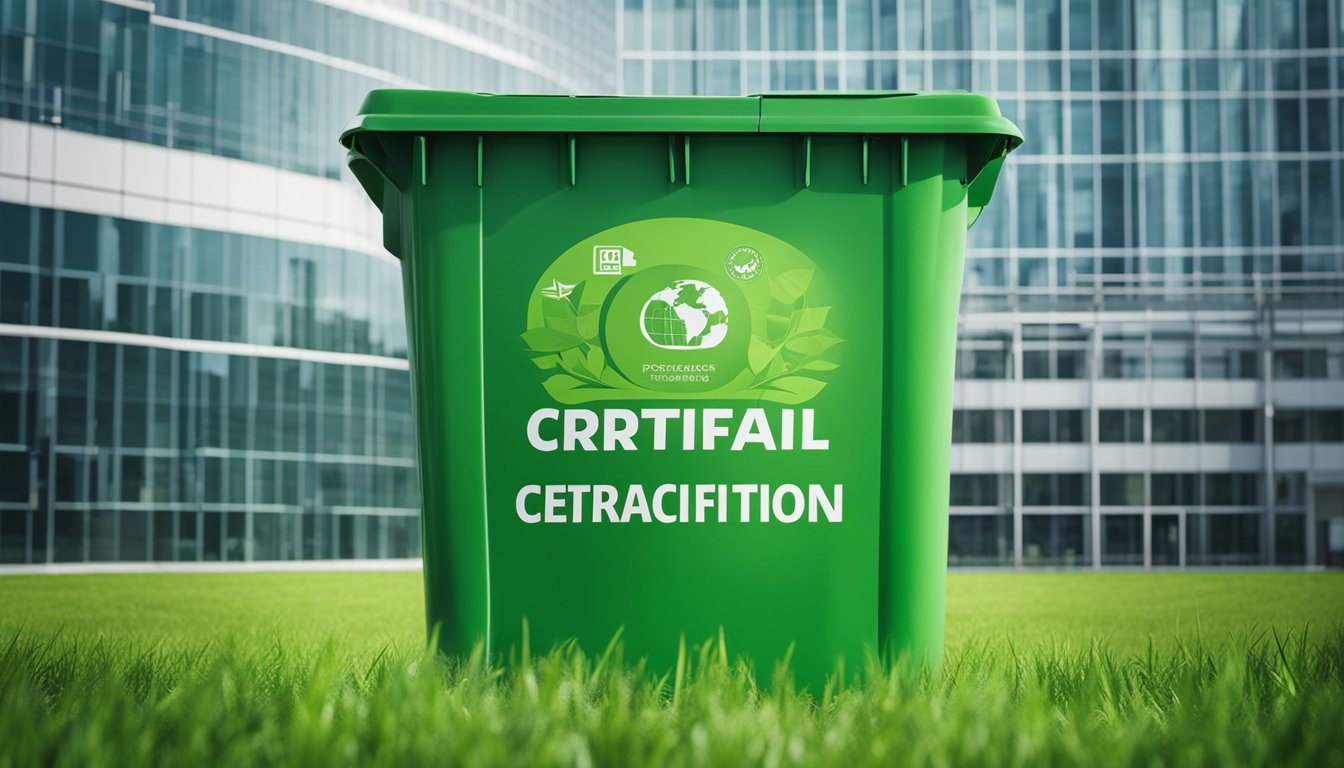Late updated: 18 Feb 2025 13:02
Written by: Amber Collins
Benefits Of Green Business Certification In The UK: Enhancing Sustainability and Reputation
In today's rapidly evolving market, businesses are increasingly recognising the importance of sustainable practices. In the UK, achieving green business certification not only enhances a company's reputation but also opens doors to financial incentives and grants designed to promote eco-friendly initiatives. Green certifications serve as a hallmark of credibility and trust, often resulting in improved customer loyalty and market differentiation.

By adopting such certifications, businesses can effectively manage environmental risks and impacts associated with their operations. Numerous certification schemes are available, tailored to suit various industries and products. This ensures that companies can align their green initiatives with specific business goals and consumer expectations.
It's not just about reputation and incentives. A green certification equips businesses with the necessary framework to implement sustainable practices, thereby contributing positively to the environment. The path towards certification, whether it involves the Green Mark or the Carbon Trust, provides comprehensive assessments to identify and mitigate environmental risks.
Key Takeaways
- Green certifications boost credibility and customer loyalty.
- Financial benefits include access to green grants and incentives.
- Certifications provide frameworks for sustainable practices.
Understanding Green Business Certification
Navigating the world of green business certifications reveals an intricate web of standards and systems focused on enhancing sustainability and environmental performance. Our exploration will unravel various types, underscoring the importance of systems like environmental management.
What Is Green Business Certification?
Green business certification recognises companies that meet stringent environmental sustainability standards. This formal acknowledgement is granted by accredited organisations such as LEED (Leadership in Energy and Environmental Design) and BREEAM (Building Research Establishment Environmental Assessment Method). Certification involves assessing a company’s energy use, resource efficiency, and overall impact on the environment.
Achieving such certification often entails a detailed evaluation of operations, ensuring adherence to global standards. The certification not only boosts the organisation’s eco-credentials but also offers tangible benefits, like operational efficiencies and improved public perception. Certification can particularly help businesses differentiate themselves in competitive markets by highlighting their commitment to environmental stewardship.
Importance of Environmental Management Systems
Environmental Management Systems (EMS) play a crucial role in structuring a company's approach to sustainability. ISO 14001, for instance, is a widely adopted standard providing a framework for effective environment management practices. An EMS allows companies to identify, manage, and decrease their environmental impacts systematically.
These systems are designed to integrate seamlessly into existing business operations, facilitating continuous improvements. For us, implementing an EMS can lead to significant reductions in waste and energy consumption. Additionally, these systems often serve as a foundation for achieving further eco-certifications, promoting a culture of ongoing commitment to sustainability.
Types of Green Certifications in the UK
The UK offers a variety of green certifications tailored to different sectors and needs. B Corp Certification assesses social and environmental performance, requiring companies to meet high standards of transparency and accountability. Another example is Planet Mark, which focuses on reducing carbon footprint.
The Green Mark certification assesses a company's sustainability initiatives, rewarding those who excel in adopting eco-friendly practices. Each certification has distinct requirements but shares a common goal: to foster a sustainable future through impactful environmental practices. We can leverage these certifications not only to enhance our market positioning but also to contribute positively to the global sustainability landscape.
Benefits of Achieving Green Certification

Green certification offers a multitude of benefits to businesses by enhancing corporate social responsibility, optimising environmental impact, and boosting brand reputation. These certifications, including ISO 14001 and EMS, help UK businesses pave the way toward a sustainable future.
Enhancing Corporate Social Responsibility
Corporate social responsibility (CSR) is vital for modern businesses. Achieving green certification like B Corp or Carbon Trust Certified underscores our commitment to sustainability and ethical practices.
Adopting such certifications reinforces our dedication to environmental stewardship. It helps in responsibly managing natural resources, reducing carbon emissions, and promoting energy-saving measures. This proactive approach positively impacts our brand image, appealing to eco-conscious customers and investors.
Environmental claims need backing from credible certifications. By achieving them, we validate our efforts in resource efficiency and contribute to a sustainable future. CSR drives us to consistently align our values with industry standards, fostering a culture of continuous improvement.
Improving Environmental Impact and Energy Consumption
Green certification propels us to adopt sustainable practices, promoting efficient environmental management systems. Utilising energy-efficient technologies, renewable energy sources, and waste management protocols reduce our carbon footprint.
Emphasising energy conservation aligns with ISO 14001 standards. It involves monitoring and reporting emissions reductions and implementing procedures to achieve net-zero targets. This not only mitigates climate change impacts but also cuts down operating costs.
Water conservation and waste reduction efforts bolster our environmental claims. By focusing on pollution reduction and recycling, we demonstrate a commitment to lowering greenhouse gas emissions and achieving carbon neutrality.
Increasing Competitive Advantage and Brand Reputation
In a competitive market, green certification sets us apart. It enhances brand reputation and positions us as leaders in sustainability. Being environmentally certified signals our dedication to eco-friendly practices, attracting customers prioritising sustainability.
The certification process, facilitated by the Carbon Trust or other institutions, guides us in improving indoor environmental quality and resource management. Certification is a badge of honour, reflecting our pursuit of excellence and innovation in sustainability.
Our initiatives in emissions reduction and energy efficiency engender trust and loyalty amongst stakeholders. This not only bolsters our market position but also ensures a sustainable achievement that resonates with the values of modern consumers.
Frequently Asked Questions

Green business certifications offer a range of benefits, from enhancing brand reputation to promoting sustainability. In this section, we address common inquiries related to specific certifications and their impacts on companies in the UK.
What advantages can businesses gain from achieving B Corp certification?
B Corp certification demonstrates a company’s commitment to social and environmental performance. For UK businesses, this certification can improve trust and credibility with consumers. It also provides access to a network of like-minded organisations, fostering collaboration and driving innovation.
How does ISO 14001 accreditation benefit companies in the United Kingdom?
ISO 14001 focuses on effective environmental management systems. UK firms with this accreditation often see increased efficiency and reduced waste. It can also lead to cost savings by identifying areas for resource optimisation and securing a competitive edge in environmentally-conscious markets.
What are the incentives for organisations to pursue green building certification?
Green building certifications, like BREEAM, attract government incentives and ethical investors. These certifications can reduce operating costs through energy efficiency and increase property value. Additionally, they often result in healthier, more productive working environments.
Is LEED certification widely recognised and utilised within the UK market?
LEED is increasingly recognised in the UK, especially in urban developments. Its global reputation enhances marketing opportunities for certified buildings. Although BREEAM is more prevalent in the UK, LEED offers international appeal for companies targeting the global market.
In what way does green business certification contribute to environmental sustainability?
Green business certifications drive improvements in resource efficiency and pollution reduction. By mandating sustainable practices, they help organisations minimise their environmental footprint. This fosters long-term ecological balance and supports the UK’s sustainability goals.
What is BREEAM certification, and how does it impact construction practices in the UK?
BREEAM sets standards for sustainable building design and construction in the UK. It influences the industry by promoting practices that reduce energy consumption and environmental impact. As a result, it encourages the development of buildings that are both eco-friendly and cost-effective.
